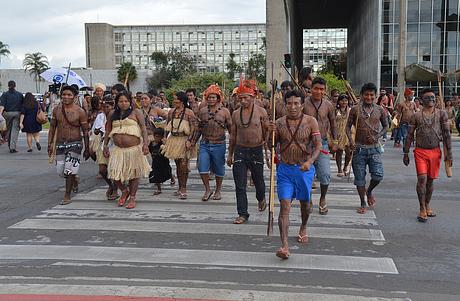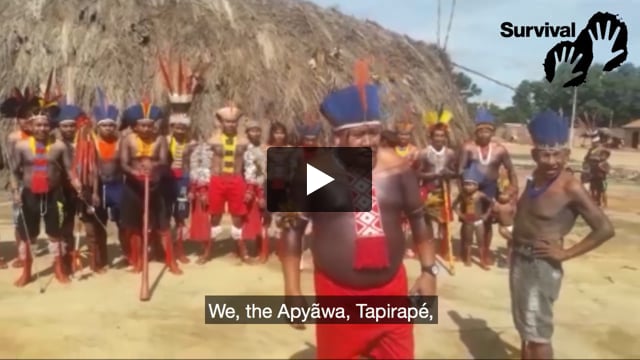Brazil - Indigenous affairs chief quits following Indian killing
June 11, 2013
 © Antônio Cruz/ABr
© Antônio Cruz/ABrThis page was last updated in 2013 and may contain language which is now outdated.
The head of Brazil’s Indigenous affairs department, FUNAI, resigned on 7 June, citing ill health.
Dr Marta Azevedo took office just over a year ago, and declared that the situation of the Awá and Guarani tribes was a top priority.
Many believe that her resignation was precipitated by the recent killing of a Terena Indian by the police, and by the government’s moves to weaken Indigenous peoples’ rights and to undermine FUNAI’s powers. These moves have caused a wave of anger amongst Brazil’s Indigenous people and their supporters.
Protests have erupted throughout Brazil in recent months as Indians seek to defend their hard-won constitutional rights against a government intent on industrialization and ‘development’ seemingly at any cost.
As the Marubo Indians of western Brazil said recently ‘We want President Dilma Rousseff to turn this country into a real ‘democracy’ and to consider Indigenous peoples’ achievements in the guaranteeing of their territories. After 513 years of massacres and genocides…we want to be able to look to an image of a Brazil with a better future.’
Dilma Rousseff is the only president since the fall of the military dictatorship in 1985 who has not met with any Indigenous representatives.
Last week 150 Indians traveled to the capital, Brasilia, to talk with the government about the lack of consultation over its controversial plans to build hydroelectric dams along several major tributaries of the Amazon.
After the meetings, the Munduruku wrote to the government declaring that, ‘Now our own land has become a battle ground where we are being exterminated and assassinated by the government’s armed forces.’
At the same time Guarani and Kaingang Indians blocked roads to protest at the lack of progress in land demarcation.
COIAB, the coordinating body of Indigenous organizations of the Brazilian Amazon, stated, ‘The current government is trying to impose its colonial and dominating style on us. … [it] has caused irreversible harm to Indigenous peoples using bills and decrees, many of them unconstitutional’.
One bill under discussion would prohibit the expansion of Indigenous territories and will affect tribes living in the agricultural mid-west and south, where violent land conflicts are most acute and where Brazil’s powerful rural lobby includes politicians who own ranches on Indigenous land due to be returned to the Indians.
It will be particularly disastrous for the Guarani in Mato Grosso do Sul state, who live in roadside camps or overcrowded reserves and whose leaders have been systematically attacked and murdered by ranchers’ gunmen as they attempt to regain their ancestral land.
A proposed constitutional amendment would give congress (dominated by the agricultural and mining lobby) the power to participate in the process of demarcating Indigenous land, causing further delays to the protection of territories.
Politicians from mineral-rich states in the Amazon are backing a mining bill which, if approved by congress, would open up Indigenous territories to large-scale mining for the first time. The Yanomami territory alone is subject to 654 mining requests.
Dozens of anthropologists in Brazil signed a manifesto which states that ‘progress’ and ‘development’ have no purpose if they do not respect the constitution.
Representatives from several NGOs recently wrote to President Rousseff about the dismantling of Indigenous rights in light of the discovery of the Figueiredo report, which documented shocking atrocities suffered by Indians in the 1940s, 50s and 60s.




